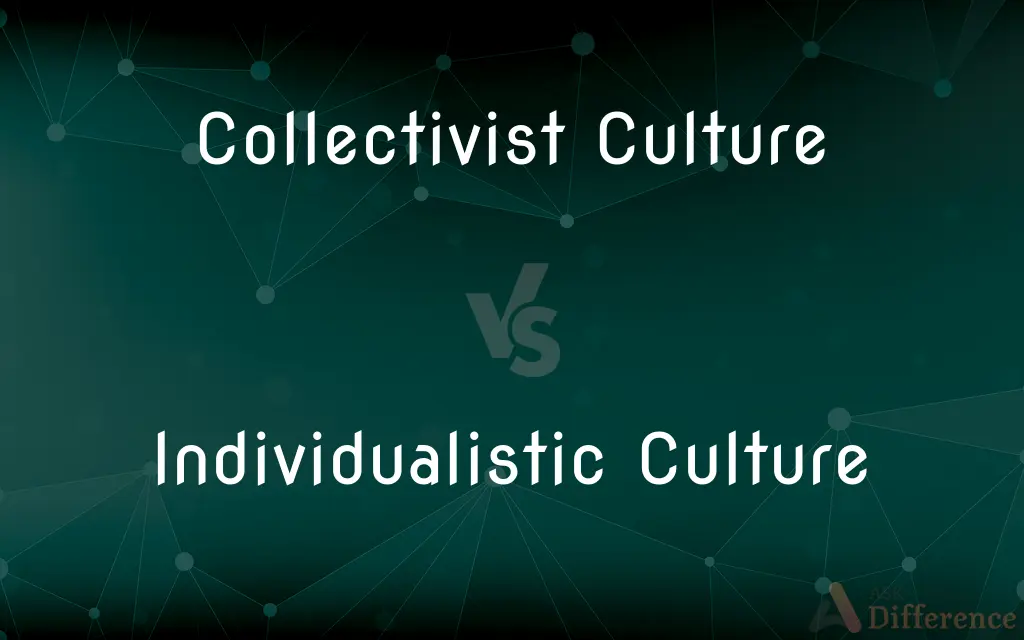Collectivist Culture vs. Individualistic Culture — What's the Difference?
By Maham Liaqat & Urooj Arif — Published on March 24, 2024
Collectivist cultures prioritize group goals and harmony, emphasizing family and community cohesion, whereas individualistic cultures value personal freedom, self-expression, and individual achievement.

Difference Between Collectivist Culture and Individualistic Culture
Table of Contents
ADVERTISEMENT
Key Differences
Collectivist cultures stress the importance of community and family, advocating for collective goals over individual desires. In contrast, individualistic cultures champion personal autonomy, encouraging individuals to pursue their own ambitions and express their uniqueness.
In collectivist societies, identity is often rooted in social groups, such as family or community, with a strong sense of belonging and loyalty. Meanwhile, individualistic cultures promote self-identity and personal achievements, where success is measured by personal milestones and accomplishments.
Decision-making in collectivist cultures typically involves consulting with family or community members, reflecting a preference for consensus and group harmony. In individualistic societies, decisions are more likely to be made independently, valuing personal choice and self-determination.
Social behavior in collectivist cultures is geared towards maintaining harmony and avoiding conflict within the group, often leading to indirect communication styles. Individualistic cultures, however, encourage direct communication and assertiveness, prioritizing honesty and individual opinions.
Regarding responsibility, collectivist cultures emphasize mutual support and shared duties within the group, whereas individualistic cultures focus on personal responsibility and self-reliance, expecting individuals to take charge of their own lives.
ADVERTISEMENT
Comparison Chart
Goals and Values
Group harmony and collective goals
Personal freedom and individual achievement
Identity
Based in the group (family, community)
Rooted in the individual
Decision-Making
Collective, seeking consensus
Independent, valuing personal choice
Communication Style
Indirect, to maintain harmony
Direct, prioritizing honesty
Responsibility
Shared within the group
Personal and self-reliance
Compare with Definitions
Collectivist Culture
A culture that values the goals of the group over the individual.
In a collectivist culture, weddings are grand events celebrated by the entire community.
Individualistic Culture
Celebrates personal freedom and self-expression.
Individualistic societies encourage self-discovery and pursuing one’s passions.
Collectivist Culture
Communication aims to preserve social harmony.
People in collectivist cultures may avoid confrontation to not disrupt group harmony.
Individualistic Culture
Emphasizes personal responsibility and independence.
In individualistic cultures, individuals are expected to be self-reliant from a young age.
Collectivist Culture
Emphasizes family ties and community loyalty.
In collectivist societies, living with extended family is common and valued.
Individualistic Culture
A culture that prioritizes personal achievement and autonomy.
In individualistic cultures, moving out for college is a rite of passage.
Collectivist Culture
Decisions are made with the group's interest in mind.
Choosing a career in a collectivist culture often involves considering family expectations.
Individualistic Culture
Decisions are made based on personal preference.
Choosing a career in an individualistic culture is largely based on personal interest.
Collectivist Culture
Responsibility is seen as a collective duty.
In collectivist cultures, elder care is often a shared family responsibility.
Individualistic Culture
Communication is direct, valuing honesty.
Direct feedback in the workplace is common in individualistic societies.
Common Curiosities
What is the key difference between collectivist and individualistic cultures?
The key difference lies in their values: collectivist cultures prioritize group goals, while individualistic cultures focus on personal freedom and achievement.
What characterizes communication in individualistic cultures?
Communication in individualistic cultures is typically direct and assertive, emphasizing honesty and personal opinion.
Can someone from a collectivist culture thrive in an individualistic society, and vice versa?
Yes, individuals can adapt to different cultural norms, but it may require adjustments in values, communication styles, and social behaviors.
How do collectivist cultures handle decision-making?
Collectivist cultures prefer making decisions through consensus and considering the group's well-being.
How does identity differ in collectivist vs. individualistic cultures?
In collectivist cultures, identity is tied to the group, whereas in individualistic cultures, it’s defined by personal attributes and achievements.
How do these cultural differences affect conflict resolution?
Collectivist cultures aim for harmony and may avoid direct confrontation, while individualistic cultures are more likely to address conflicts openly.
Can a country have both collectivist and individualistic traits?
Yes, many countries display a mix of both, often influenced by globalization and cultural exchanges.
Do collectivist societies discourage individual success?
Not necessarily; they value individual achievements that contribute to the group’s success and harmony.
Is one cultural orientation better than the other?
Neither is inherently better; they simply reflect different societal values and practices.
How do children’s upbringing differ in these cultures?
Children in collectivist cultures are raised with a strong emphasis on family and community, while those in individualistic cultures are encouraged to develop autonomy and self-expression.
How does education reflect these cultural differences?
Education in collectivist cultures often focuses on group learning and cooperation, whereas in individualistic cultures, it emphasizes personal achievement and competition.
How do these orientations influence relationships?
Relationships in collectivist cultures are deeply interdependent, while in individualistic cultures, they are often based on mutual interest and independence.
How do these cultural orientations impact workplace dynamics?
In collectivist cultures, teamwork and group consensus are valued, while individualistic cultures prioritize individual goals and autonomy.
Does globalization lead to more individualistic societies?
Globalization can promote individualistic values, but cultural traditions and values also persist and adapt.
How does social welfare differ between these cultures?
Collectivist cultures might rely more on community and family support, whereas individualistic cultures may emphasize government and social institutions for welfare.
Share Your Discovery

Previous Comparison
Political Leadership vs. Military Leadership
Next Comparison
Physiotherapy vs. Massage TherapyAuthor Spotlight
Written by
Maham LiaqatCo-written by
Urooj ArifUrooj is a skilled content writer at Ask Difference, known for her exceptional ability to simplify complex topics into engaging and informative content. With a passion for research and a flair for clear, concise writing, she consistently delivers articles that resonate with our diverse audience.











































